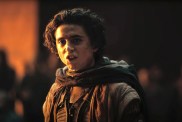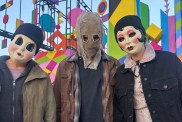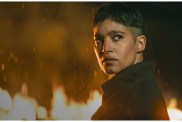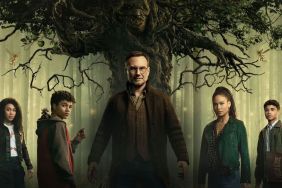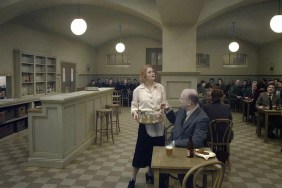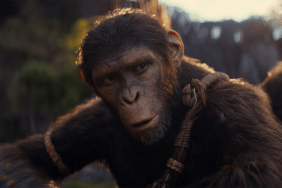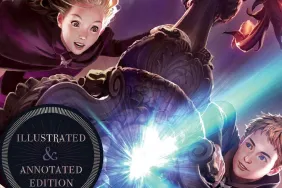
Shock: You discussed the movies of the ’70s, but as an actor, do you generally know those movies or do you try to watch them to get a feel for how they acted back then?
Evans We talked about it. I was working and we talked on Skype and I had a lot of movies sort of stacked up just coincidentally, so we started talking about movies, and I did watch “Don’t Look Now” just to kind of gauge and get an understanding of what Ivan was talking about after Ivan told me his ideas and inspirations for different scenes. You soon realize when you watch those, and even the newer ones like “The Orphanage” I watched, which del Toro produced, and you realize how important sound design is and the movement of the camera. As Ivan will tell you, you use a lot of zooms which creates tension. It was very interesting, and you realize how integral that stuff is.
Shock: I always curious where your headspace is when making a horror movie and how to make it feel real.
Evans: Funnily enough, I don’t really think about it as a horror movie. It’s just a story this guy is going through. From day to day, as an actor, I don’t really see it as a horror movie. I saw it as this man who discovers his wife is cheating on him and so there’s a sense of loss and betrayal and all those different emotions. I think when you’re experiencing stuff you don’t step out of it and go, “Oh, this is this.” I think maybe in hindsight.
Kavanagh: I’d rather they be the character and forget about the story.
Evans: It feels very real to me when I’m doing it so
Kavanagh: It’s all about the moments of that particular scene, and everything else doesn’t matter. You shouldn’t be thinking about what’s coming next.
Evans: As an actor, you can’t really play horror, you know what I mean? One hopes that with Ivan guiding us that he has an understanding and a vision of the whole thing that we don’t as actors and he knows in the process of editing what’s going to happen, so you just play in the moment really.
Shock: I think that’s one of the reasons it works. I think those horror movies you mention work because they’re not being treated as horror movies.
Kavanagh: Absolutely. They’re something else as well.
Shock: Right, like “The Orphanage” could just be about a woman whose child has gone missing.
Kavanagh: After you watch say “The Orphanage” or something like that for the first time, after you get over the frightening elements of it, you can watch it on a different level altogether. You can watch it for what you just said that it’s about a woman, it’s about loss, it’s about many different things and hopefully, this is that type of film as well that people will rewatch and see something different.
Shock: One thing I also like about “The Canal” is the location. Maybe it’s because I’m American and I’ve never been to Ireland, but it feels almost exotic, because you have a lot of older architecture and locations.
Kavanagh: Well, I grew up around the canal area and I had all these memories about the canal. For me, my memories of it was this filthy place, but it was very atmospheric. It was frightening but you were kind of attracted to it at the same time, so that was what I wrote about. The problem was that when we went to look for those, they were all cleaned up and renovated, so it took us ages to find the right run-down location. Actually, I found it on Google Maps in the end. I followed the canal on the map and I found this industrial area, and I took a trip down and we toured the quadrant and I saw the pylons and the factories, and the toilet was a real location as well, that disgusting toilet. But we added to the disgustingness of it, but it was that decay and the filth of it, I thought that was really important to the film. Because it’s about what’s happening in his mind. His mind is decaying and I think the sets should reflect that as well.

Shock: Were there a lot of dead bodies in the canal when you were a kid?
Kavanagh: It’s funny you should say that because someone had drowned themselves but I couldn’t tell any of the actors that were going in. Someone’s body had been found just a few weeks before in that exact location.
Evan: You are kidding. Thank God you didn’t tell Hannah (Hoekstra) that.
Kavanagh: There’s a lot of suicides around that area.
Shock: I can’t ask a lot more because I really don’t want to spoil it for people
Kavanagh: That’s the problem. I was doing an intro last night and I couldn’t really say anything because if you haven’t seen it then you’ll spoil it for people.
Shock: Where do you go from here? You just finished this movie recently I’d imagine.
Kavanagh: Well, we had the premiere last night and we have a sales agent and apparently there’s a lot of interest so we’ll see what happens. I have another film gearing up for the end of the year. I’m writing another psychological horror at the moment, it’s basically a short story about a quite well known orchard. I’m really excited about that because it’s turning out really well.
Shock: I looked over your filmography and I was shocked how many movies you’ve made that I haven’t seen.
Kavanagh: Well, “Tin Can Man” is being released here, for the first time on DVD. We made that for under 1,000 Euro, and it took on a life of its own. I used to produce all my own films and edit them, shoot some of them–I worked with one DPand I did the sound and the sound design and the music. The problem was that I was more interested in making them then getting them out there, so what I’d do is I’d make it and then I got another idea and I’d move quickly onto the next one. But now they’re starting to get out there which is great.
Shock: Tribeca is a great film festival for the movie and I’m sure it’s going to get a lot of attention here. I’ve been telling a lot of people they should see it.
Evans: I think what Tribeca are really good at is helping directors, and they have a really good program where they really champion different kinds of stuff. Like “The Canal,” I think it’s really different and it blends different genres. It’s not just a simple horror, it’s got real character-driven stuff, so I’m really pleased that people are seeing it.
Kavanagh: It’s amazing to hear people’s different interpretations of the film. Everything I’ve read about it, good or bad, it’s all been so different from anybody else’s. I think that’s right with certain budget films to get people talking because they can debate it. I love that, I love films that are divisive, those are my favorite type of films.
Shock: Tribeca seems to find a lot of great films out of Ireland as well.
Kavanagh: That’s true. I don’t know how they find them, but it’s amazing.

Shock: What’s the film scene like in Ireland these days? Do you feel there’s any kind of camaraderie between filmmakers who work together?
Kavanagh: Maybe all filmmakers feel like this, but you feel strangely alone. You hear about all of these filmmakers but you’re so involved with your own thing you feel kind of isolated and alone, but there certainly is a lot more activity than there used to be. Like Piers McGrail who shot this did fantastic job, he’s working a lot. He’s really an up and coming guy and he’s working on a lot of really good Irish films. I’m working with him again hopefully on subsequent films, it was a great collaboration.
Shock: Cool. What about you, Rupert, what do you have coming up next?
Evans: Right now, I’m just filming a thing for the BBC so I’m back in London doing that. I just done a one-off TV thing with another director called “Secret.” Just TV really, so we’ll see. After this job I’m doing now, that takes me up until July, so then we’ll see what happens after that. There’s a few things might happen but I don’t know yet.
The Canal will be released by The Orchard in October, and as we mentioned, if you’re at Comic-Con in San Diego this week, it will be having a special screening at the Gaslamp 15, 701 5th Avenue, on Friday, July 25 at 8pm.
